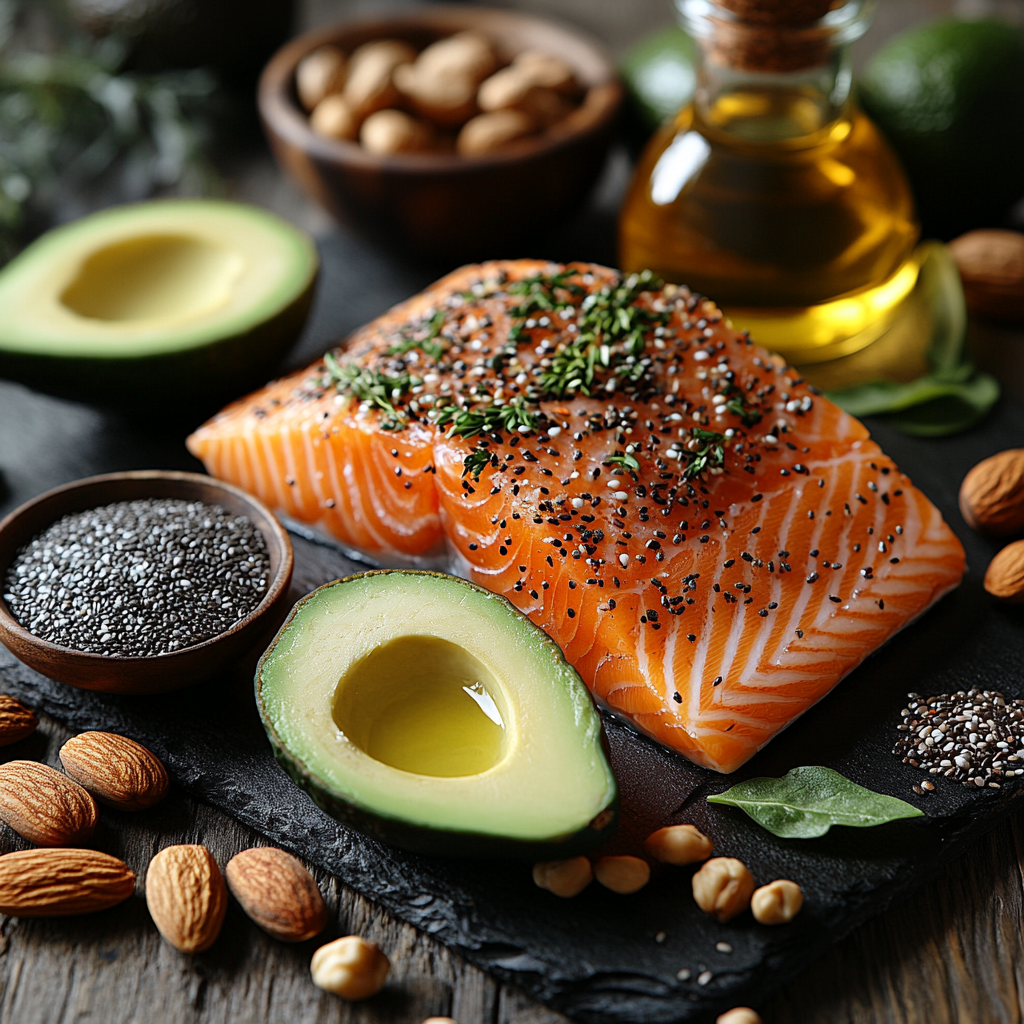
Imagine a diet that not only allows but encourages you to eat delicious foods like avocados, nuts, and even dark chocolate—without guilt. For years, fats have been vilified in the health and fitness world, blamed for everything from weight gain to heart disease. But what if we've been misled? The truth is, not all fats are created equal, and some are essential for a healthy, active lifestyle.
In this article, we will debunk the common myths surrounding fats and shed light on the role of healthy fats in your diet. We'll explore the types of fats that are not only safe to consume but are vital for your well-being. This guide is tailored for health-conscious, active, and outdoor-loving food enthusiasts, particularly families who enjoy staying fit and maintaining a balanced lifestyle. Whether you're a seasoned fitness enthusiast or a family looking to improve your dietary habits, this article will provide you with valuable insights into how to embrace healthy fats for optimal health.
1. Understanding the Different Types of Fats
Before we delve into the benefits of healthy fats, it’s important to understand the different types of fats and how they affect your body.
a. Saturated Fats: The Controversial Player
Saturated fats, found in animal products like meat and dairy, have long been associated with increased cholesterol levels and heart disease. However, recent research challenges this view, suggesting that the relationship between saturated fat and heart disease is more complex than previously thought.
What the Research Says: A comprehensive review published in the British Medical Journal found no significant evidence linking saturated fat with an increased risk of cardiovascular disease. Instead, the study emphasizes the importance of the overall dietary pattern and the quality of the fat consumed.
Key Takeaway: While it's still wise to consume saturated fats in moderation, particularly from whole food sources, they may not be as harmful as once believed. Balance and variety in your fat sources are key.
b. Unsaturated Fats: The Heart’s Best Friend
Unsaturated fats, which include monounsaturated and polyunsaturated fats, are considered the "good" fats. These fats are found in foods like avocados, olive oil, nuts, seeds, and fatty fish.
Health Benefits: Unsaturated fats are known to reduce bad cholesterol levels (LDL) and increase good cholesterol levels (HDL). They also provide essential fatty acids, such as omega-3s, which have anti-inflammatory properties and are crucial for heart and brain health.
Consider the Mediterranean diet, which is rich in unsaturated fats from olive oil, nuts, and fish. Studies have shown that this diet reduces the risk of heart disease, improves cognitive function, and supports longevity.
Key Takeaway: Incorporating more unsaturated fats into your diet can significantly improve your cardiovascular health and overall well-being.
c. Trans Fats: The Real Enemy
Unlike saturated and unsaturated fats, trans fats have no health benefits and are harmful to your health. These fats are artificially created through hydrogenation and are commonly found in processed foods like baked goods, snacks, and margarine.
What the Experts Say: According to the American Heart Association, trans fats increase bad cholesterol levels while lowering good cholesterol, leading to an increased risk of heart disease, stroke, and type 2 diabetes.
Key Takeaway: Avoid trans fats as much as possible by reading labels and steering clear of processed foods that contain partially hydrogenated oils.
2. Debunking Common Myths About Fats
There are many misconceptions about fats that have led to confusion and unhealthy dietary choices. Let’s debunk some of the most common myths.
a. Myth 1: Eating Fat Makes You Fat
This is perhaps the most pervasive myth. The idea that dietary fat directly translates to body fat has been debunked by numerous studies. While all fats are calorie-dense, they do not necessarily lead to weight gain when consumed in moderation and as part of a balanced diet.
Expert Opinion: Dr. Mark Hyman, a leading functional medicine expert, states that healthy fats can actually help regulate your metabolism, reduce cravings, and keep you feeling full longer, which can aid in weight management.
Key Takeaway: It’s not fat that makes you gain weight—it’s consuming more calories than your body needs, regardless of where those calories come from.
b. Myth 2: Low-Fat Diets Are Healthier
In the 1990s, low-fat diets were all the rage, with the belief that cutting out fat would lead to better health and weight loss. However, these diets often replaced fats with refined carbohydrates and sugars, which can be more detrimental to your health.
What the Research Says: Studies have shown that low-fat diets are not more effective for weight loss than diets higher in healthy fats. In fact, replacing fats with refined carbs can lead to insulin resistance, weight gain, and an increased risk of chronic diseases.
Key Takeaway: Focus on the quality of the fats in your diet rather than simply reducing your fat intake.
c. Myth 3: All Fats Are Bad for Heart Health
As mentioned earlier, not all fats are created equal. While trans fats and excessive saturated fats can harm heart health, unsaturated fats are beneficial and even necessary for maintaining a healthy heart.
The American Heart Association recommends including more unsaturated fats in your diet to protect against heart disease, highlighting the benefits of nuts, seeds, and fatty fish.
Key Takeaway: Embrace healthy fats as part of a heart-healthy diet.
3. Embracing Healthy Fats in Your Diet
Now that we’ve debunked the myths, let’s explore how to incorporate healthy fats into your diet effectively.
a. Cooking with Healthy Oils
Olive oil, avocado oil, and coconut oil are excellent choices for cooking. They provide healthy fats and add flavor to your dishes.
Tip: Use olive oil for sautéing vegetables, avocado oil for grilling, and coconut oil for baking to enhance both the taste and nutritional value of your meals.
b. Adding Nuts and Seeds
Nuts and seeds are nutrient-dense and provide a good source of healthy fats, fiber, and protein. They make a great snack or addition to salads, oatmeal, and smoothies.
Tip: Keep a mix of almonds, walnuts, chia seeds, and flaxseeds on hand for a quick and nutritious snack.
c. Including Fatty Fish
Fatty fish like salmon, mackerel, and sardines are rich in omega-3 fatty acids, which are crucial for brain and heart health.
Tip: Aim to include fatty fish in your meals at least twice a week to reap the benefits of these essential fats.
4. Analysis and Insights
The shift in understanding about fats reflects a broader trend in nutrition science, where the focus is moving from macronutrient elimination to nutrient quality and balance. Embracing healthy fats is part of a more holistic approach to eating that prioritizes whole foods and mindful consumption.
a. The Challenge of Overcoming Old Beliefs
Despite the growing body of evidence supporting healthy fats, many people still cling to outdated beliefs about fat intake. The challenge lies in re-educating the public and encouraging a shift in dietary habits.
Education and clear communication are key to changing these misconceptions. As health-conscious individuals and families, it’s important to stay informed and make dietary choices based on current research rather than outdated guidelines.
b. Opportunities for a Balanced Diet
Embracing healthy fats opens the door to a more balanced and satisfying diet. Instead of fearing fats, we can appreciate their role in providing energy, supporting brain function, and enhancing the flavor of our meals.
By incorporating a variety of healthy fats into your diet, you can enjoy a diverse range of foods that support your overall health and well-being.
Conclusion
Healthy fats play a crucial role in a balanced diet, supporting everything from heart health to brain function. By debunking the myths surrounding fats and embracing the benefits of unsaturated fats, you can enhance your diet and improve your overall well-being.
Whether you’re cooking with healthy oils, snacking on nuts, or enjoying a serving of fatty fish, these fats should be a welcome part of your meal plan. It’s time to move beyond the outdated fear of fats and embrace a more informed, balanced approach to eating.
Call to Action
Ready to take the next step in your wellness journey? Start by incorporating more healthy fats into your meals this week and notice the difference in your energy levels and satisfaction. And don’t forget to join us for the next article in FULL LIFE ALL THE WAY, where we’ll dive into the topic of "Keto and Paleo Diets Explained: How Our Cakes Fit Perfectly Into Your Lifestyle". It’s time to nourish your body, mind, and soul—one healthy choice at a time.
By Guillermo Brillembourg
References:
- British Medical Journal. (2015). "Saturated fats and cardiovascular disease: Re-evaluation of the evidence."
- American Heart Association. (2020). "Trans Fats and Heart Disease."
- Hyman, M. (2018). "The Food Fix: How to Save Our Health, Our Economy, Our Communities, and Our Planet – One Bite at a Time."




